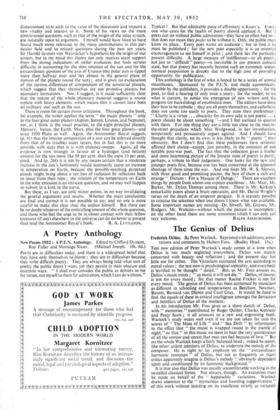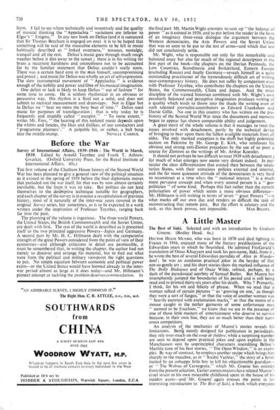The Genius of Delius
Frederick Delius. By Peter Warlock. Reprinted with additions, anno- tations and comments by Hubert Foss. (Bodley Head. 15s.) THIS new edition of Peter Warlock's study comes at a time when Delius is too much neglected everywhere. Delius was mainly concerned with beauty and reflection ; and the present day has little use for either. The Victorians estimated the arts according to moral values ; the test now is psychological topicality, and everybody is terrified to be thought " dated." But, as Mr. Foss assures us, Delius's music exists ; " as music it will not die." Delius, of course, is not for every mood ; for that matter Racine Fricker is not for every mood. Tke genius of Delius has been acclaimed by musicians as different in schooling and temperament as Beecham, Newman, Busoni, Bernard van Dieren and Cecil Gray. It would be hard to find the equals of these in critical intelligence amongst the detractors and belittlers of Delius of the moment.
In his introduction Mr. Foss gives us a short sketch of Delius, with " memories " contributed by Roger Quitter, Charles Kennedy and Percy Scott ; it all amounts to a new and engrossing book. Warlock's study wears well even if we are not taken far into the scores of " The Mass of Life " and " Sea Drift " by infermation to the effect that " the music is wrapped round in the mantle of night," or that " in this music we seem to hear the very quintessence of all the sorrow and unrest that man can feel because of love." But on the whole Warlock keeps a fairly balanced head ; indeed he seems, like other ardent admirers of Delius, to underrate the melody of the composer. He is right to lay emphasis on the " extraordinary harmonic resources " of Delius, but not as frequently as many critics apparently imagine is Delius's melody " obviously dependent
upon and conditioned by its harmonic background." - It is true also that Delius was usually uncomfortable working in the so-called classical forms. Not always, though. An exception must be made on behalf of the " Appalachia " variations. Warlock draws attention to the " mysterious and haunting suggestiveness of this work without insisting on its excellence strictly as variation form. I fail to see where technically and inventively and for quality of musical thinking the "Appalachia " variations are inferior to. Elgar's " Enigma." In any new book on Delius (and it is rumoured that Sir Thomas Beecham is engaged on one) it is to be hoped that something will be said of the masculine elements to be felt in music habitually described as " linked sweetness," tenuous, nostalgic, tranquil and all the rest. Delius's music goes through much rough weather before it dies away to the sunset ; there is in his writing for brass a recurrent harshness and uncouthness not to be accounted for by the familiar statement that Delius couldn't really score. There was a certain hard core in the man himself, uncompromising and proud ; and music for Delius was wholly an art of self-expression. The slow instrumental movement of " Appalachia " is evidence enough of the nobilty and power and fibre of his musical imagination.
One defect or lack is likely to keep Delius " out of fashion " for some time to come. He is seldom rhythmical in an obvious or percussive way. His rhythm is a fluid not a solid, and does not submit to metrical measurement and drum-taps. Not in Elgar but in Delius we " hear no more the busy beat of time." Delius used music for purposes of transfiguration ; that is why today he is frequently and stupidly called " escapist." " To some extent," writes Mr. Foss, " the hearing of this isolated music depends upon the whims and fancies, the likes and dislikes, of our conductors and ' programme planners'." A palpable hit, or rather, a ball bang











































 Previous page
Previous page